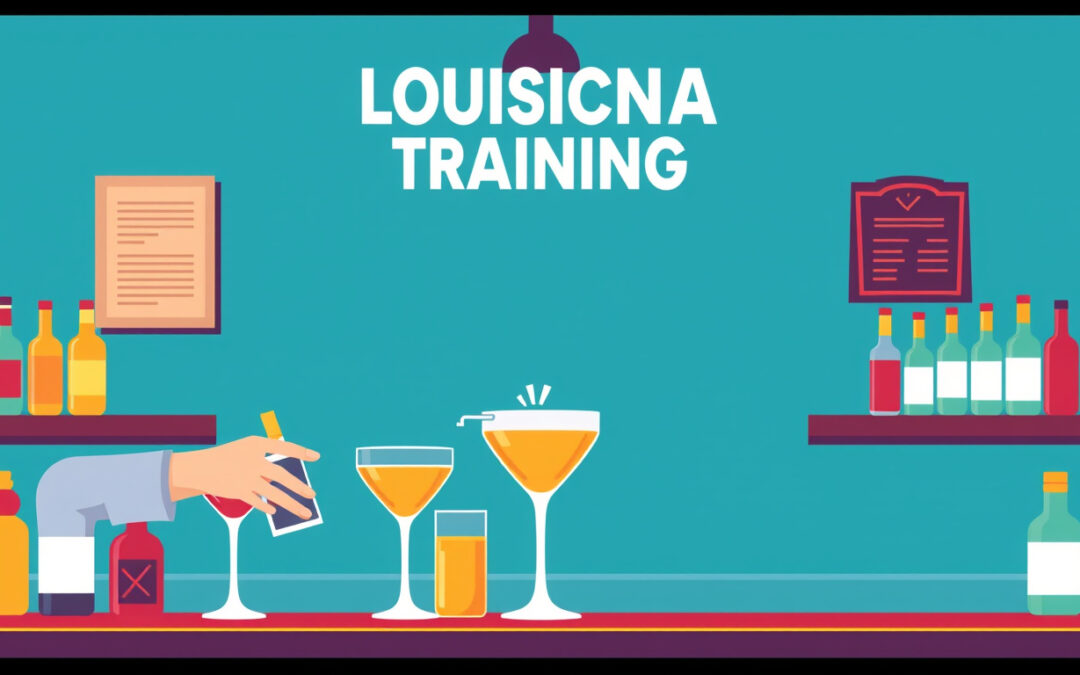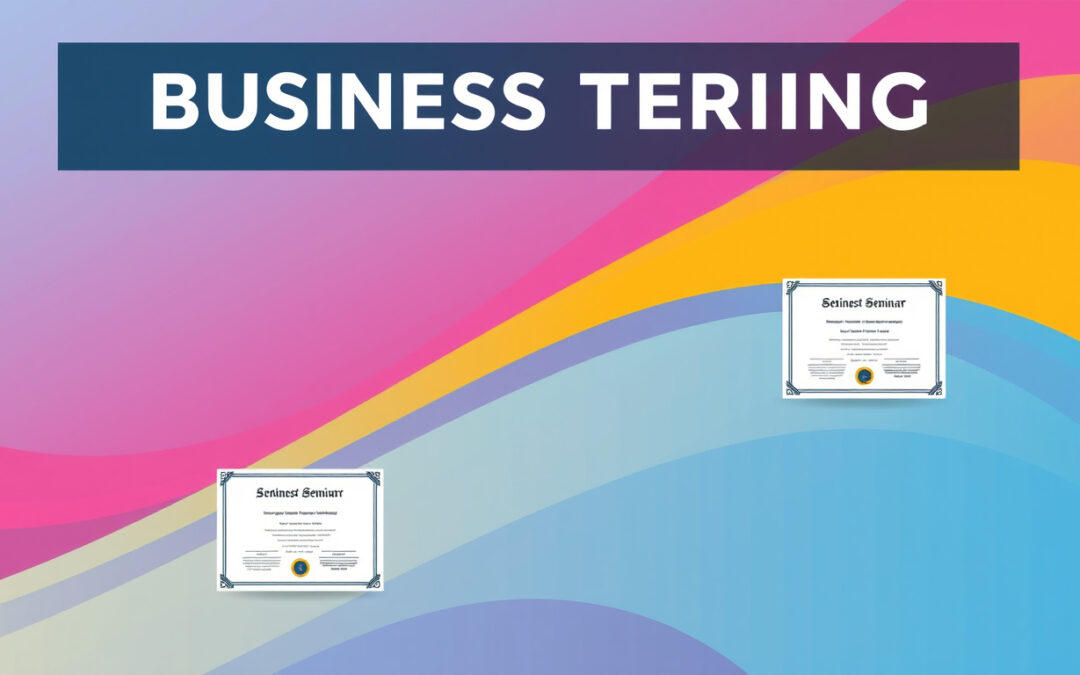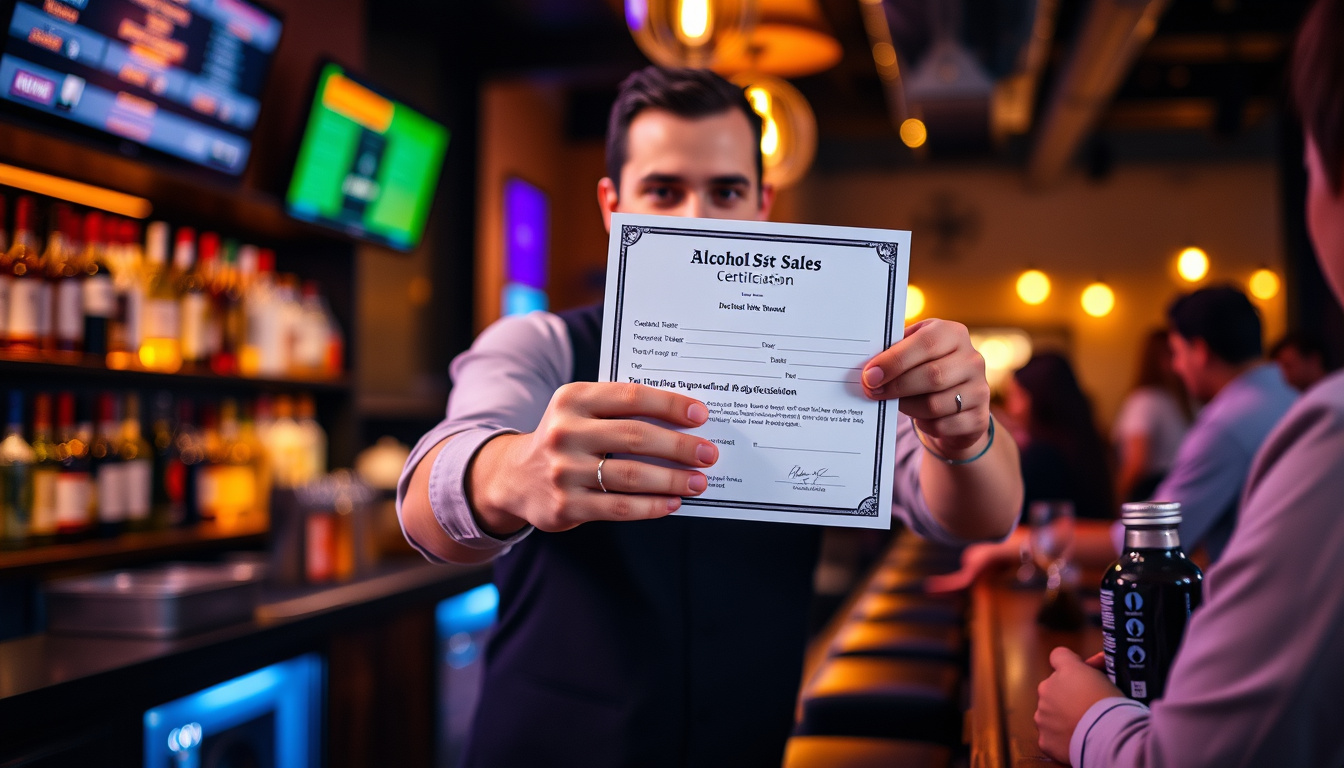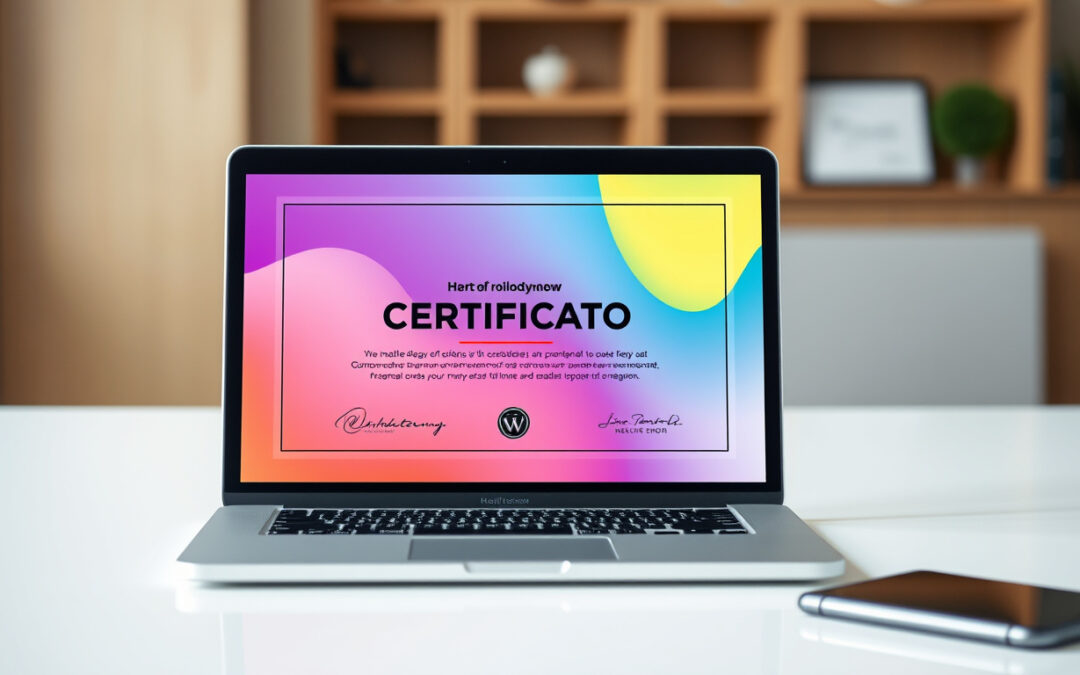
BLOG
In Louisiana, working as a server or bartender goes beyond mixing drinks and taking orders. You must know how to serve alcohol safely and legally. Louisiana alcohol server training courses build the skills you need. These courses help you keep your patrons safe, stop alcohol-related problems, and meet state law. Whether you are new or need a refresher, these tips help you serve well and protect everyone.
Understanding the Importance of Alcohol Server Training Louisiana
Alcohol server training in Louisiana is more than a rule. It builds a safe and responsible work setting. Louisiana law makes some servers take state-approved training. The training helps you spot intoxication, stop underage drinking, and learn about legal issues.
The law gives bars and restaurants a duty. They must train their staff to lower the risks of alcohol misuse. Finishing a training course shows that you meet legal rules and helps your business avoid fines or lawsuits.
What You Learn in Alcohol Server Training Louisiana
A good training course covers many topics. These lessons let you make smart choices during busy service times. You learn:
• Legal duties and penalties. You get Louisiana’s rules and the costs of over-serving or serving minors.
• How to check IDs. You learn ways to spot proper government-issued cards.
• Signs of intoxication. You see what behaviors signal that a customer has had too much.
• Refusal techniques. You learn to say “no” kindly and clearly when needed.
• Handling tough situations. You get steps for calming conflicts.
• Safe transport ideas. You encourage taxis, rideshares, or drivers to prevent accidents.
These subjects form the base for safe and legal alcohol service.
Essential Tips for Compliance in Louisiana Bars and Restaurants
Keep these tips in mind so that you can follow the rules and serve safely:
-
Complete an Approved Alcohol Server Training Course
Choose a training provider recognized by the state. These courses give you a certification that many employers need.
-
Stay Updated on Local and State Laws
Since rules can change, check the Louisiana Office of Alcohol and Tobacco Control (ATC) or Louisiana Revised Statutes for updates.
-
Practice Consistent ID Checking
Always check IDs for those who look under 30. Use clear light and look for a driver’s license or passport.
-
Know Your Limits in Serving Alcohol
Never serve too many drinks. Stop service if a guest shows signs of impairment.
-
Document Refusals of Service
Write down when you refuse service and why. A record can protect your establishment.
-
Communicate Clearly with Customers
Speak politely but firmly about the rules for serving alcohol.
-
Encourage Safe Transportation
Suggest taxis or rideshare services, or help arrange a designated driver.
By using these practices, you help protect yourself, your employer, and your community.

Benefits of Completing Alcohol Server Training Louisiana
The training brings benefits beyond legal checks. Benefits include:
• Reduced liability. Complete training lowers the risks of legal trouble.
• Enhanced safety. You learn to spot and manage intoxicated or underage guests.
• Better customer service. You gain skills to handle hard situations with calm and clarity.
• Strong business reputation. Responsible service builds trust and return customers.
• Career advancement. Certification adds value to your profile in hospitality.
For employers, these gains offer safer venues and fewer legal challenges.
How to Choose the Right Alcohol Server Training Course in Louisiana
All training courses are not the same. When picking a course, check that it:
• Has State Recognition – It must be approved by Louisiana’s Alcohol and Tobacco Control (ATC).
• Offers a Suitable Course Format – Find one that is online, in-person, or hybrid as you prefer.
• Has a Comprehensive Curriculum – It should talk about legal issues, how to check IDs, signs of intoxication, and refusal tactics.
• Provides Certification – You want a course that gives you a valid certificate in Louisiana.
• Fits Your Budget and Schedule – Many courses can be finished in just a few hours.
A quality course meets what your employer and the state expect.
Steps to Get Started with Alcohol Server Training Louisiana
If you are new to alcohol service or must meet rules, follow these steps:
-
Research Accredited Training Providers
Check the Louisiana ATC website or reliable hospitality groups.
-
Enroll in a Course
Pick a provider and course format that fits your time and money.
-
Complete the Training Modules
Focus on learning key ideas and practical actions.
-
Pass the Final Assessment
Most courses test you to make sure you understand the topics.
-
Obtain Your Certificate
This shows your employer that you meet the law.
-
Keep Your Certification Updated
Some courses need renewal or extra study over time.
Following these steps helps you serve alcohol safely and legally.
FAQ: Alcohol Server Training Louisiana
Q1: Is alcohol server training in Louisiana mandatory?
A1: Yes. Louisiana requires those who serve alcohol to finish a state-approved training course.
Q2: How often do I need to renew my alcohol server training certification in Louisiana?
A2: Renewal rules depend on the provider, but generally you must renew every three years.
Q3: Can I complete alcohol server training Louisiana online?
A3: Yes. Many state-approved providers offer online alcohol server training courses.
Conclusion
Alcohol server training Louisiana is a key part of working in hospitality in the state. Knowing your legal duties, spotting over-intoxication, and following best practices keeps your work safe and fair. These tips help you serve with confidence and care. Invest in quality alcohol server training and support Louisiana’s promise of safe alcohol service.
For more information on alcohol server training rules in Louisiana, visit the Louisiana Office of Alcohol and Tobacco Control website (source).

BLOG
In today’s competitive market, businesses need alcohol sales certification. This certification lets you sell drinks legally and safely. Bars, liquor stores, and restaurants must get it to follow local rules. This guide explains what certification means, why it matters, and how to earn it so your business can grow.
What Is Alcohol Sales Certification?
Alcohol sales certification is the official nod that you may sell alcoholic drinks. It depends on where you work and what type of sale you do. Some sell drinks on-site, while others serve them off-site.
The certification needs you to finish a training course. The course shows you how to check IDs, spot intoxication, block sales to minors, and follow the law.
Why Is Alcohol Sales Certification Important?
Getting certification builds a strong business base. It shows you obey the law, lowers risk, and builds trust with customers. Here’s how:
- Legal Compliance: States often require permits and certified staff. Not following the law can bring fines, license loss, or closure.
- Promotes Responsible Service: Training helps your team serve drinks with care and reduces over-serving.
- Enhances Reputation: Customers trust places that serve alcohol safely.
- Reduces Liability: Certification shows you took steps to train staff and keep customers safe.
For instance, the National Institute on Alcohol Abuse and Alcoholism (NIAAA) notes that training programs lower alcohol-related harms and help create safer spaces.
How to Obtain Alcohol Sales Certification: Step-by-Step Process
The process can change by state or country. But the steps stay similar:
1. Determine Your State or Local Requirements
Check with your state’s Alcohol Beverage Control board or local authority. They show you what licenses and certifications you need.
2. Enroll in a Certified Alcohol Sales Training Program
Many places require staff to finish a training course. The program may happen online or in person. It covers how to:
• Check IDs and verify age
• Spot intoxicated customers
• Handle difficult situations
Popular courses include TIPS (Training for Intervention Procedures) and ServeSafe Alcohol.
3. Complete the Training Course
In the course, you learn the key parts of safe alcohol service. When done, you get a certificate that proves your skills.

4. Submit Necessary Documentation
Send all required documents to your local licensing office. This may include your certification, business license, and permit forms.
5. Maintain Your Certification
You may need to renew your certification and take refresher courses. This keeps you up to date with changing laws.
Types of Certifications and Permits for Alcohol Sales
Many permits and certifications exist. They help structure your business:
- Alcohol Seller/Server Certification: For individuals who sell or serve drinks.
- Retail Alcohol License: For shops selling alcohol.
- On-Premise License: For bars and restaurants where people drink on-site.
- Off-Premise License: For stores that sell alcohol to use elsewhere.
- Manufacturer or Distributor Licenses: For those who make or deliver drinks.
Each type has clear rules and requirements.
Best Practices for Maintaining Compliance and Success
After you have certification, keep your business safe by:
- Regular Staff Training: Refresh training to stay sharp.
- Strict ID Checking Policy: Always check IDs to verify age.
- Monitor Patrons: Teach staff to spot intoxication.
- Maintain Records: Keep all licenses and certificates in reach.
- Engage with Local Authorities: Stay informed of law updates.
Frequently Asked Questions About Alcohol Sales Certification
Q1: How long does alcohol sales certification last?
A: The length can change by state. It usually lasts 1 to 3 years. You may need refresher courses.
Q2: Is certification required for all employees who sell alcohol?
A: Typically, only those who sell or serve alcohol must have it. Check local rules to know who qualifies.
Q3: Can alcohol sales certification be completed online?
A: Yes, many states offer online courses. Just make sure the program is approved by your state’s authority.
Conclusion
Alcohol sales certification is a key step for any business that sells alcohol. It shows you work safely and legally. By knowing the rules, finishing training, and keeping up with renewals, you protect your business and your customers. This certification is not just a duty—it boosts your brand and safety standards. Start your certification today and set your business on the path to long-lasting success.

BLOG
In healthcare, you must choose LSB-RVT providers you trust.
They work with veterinarians to give quality care and smooth operations.
You can grow your services or add special tests with the right LSB-RVT help.
This article gives clear steps to find LSB-RVT providers who do great work and follow medical rules.
Understanding the Role of LSB-RVT Providers in Healthcare
LSB-RVT providers are Licensed Small Business-Registered Veterinary Technicians.
They play a key role in healthcare, especially for animals.
They help veterinarians with tests, lab work, and patient care.
Their focused training makes them skilled.
Choosing the right LSB-RVT providers can boost test accuracy and care quality.
This decision is very important for any healthcare group that wants high standards.
Why Choosing Reliable LSB-RVT Providers Matters
The care you offer depends on the skill of your LSB-RVT providers.
If a provider is untrained or inconsistent, errors can arise.
These mistakes may delay treatment or break rules.
Problems like these can hurt your practice’s reputation and cost you money.
Trusted LSB-RVT providers ensure:
- Lab results are accurate and on time
- Healthcare rules are followed
- Fewer mistakes happen during procedures
- Patients get professional care
Key Strategies for Finding Reliable LSB-RVT Providers
When you search for LSB-RVT providers, use a careful process.
Below are clear steps to help you:
1. Verify Licensing and Certifications
Confirm that each LSB-RVT provider has a valid license and necessary certifications.
Licensing shows that they have met education and skill rules.
Usually, you can check their details with your state veterinary board or a professional group.
2. Evaluate Experience and Specialization
Experience matters a lot in specific fields.
Ask how long the provider has worked as an LSB-RVT.
Ask if they have worked in an area you need, like emergency care or specialized tests.
Those with more background in your focus area tend to deliver better results.
3. Check References and Reviews
Good LSB-RVT providers have happy clients and past employers.
Ask the provider for references.
Call these references to get honest opinions.
Also, check online reviews on trusted websites for more feedback.
4. Assess Technological Competence
Modern care needs new technology.
A good LSB-RVT provider knows how to use current lab tools and software.
Ask them about their experience with new lab equipment and electronic health records.
They should show that they can fit in with your practice’s tools.

5. Emphasize Clear Communication Skills
Clear words help the team work well together.
The provider must explain tests and results in simple terms.
They also need to work well with veterinarians and administrators.
An interview or call can help you see if they communicate clearly.
6. Look for Commitment to Continuing Education
Healthcare always changes, so learning is key.
Your provider should join courses, workshops, or conferences often.
Regular education shows they want to stay skilled and follow new health rules.
7. Consider Cultural Fit and Work Ethic
A provider’s attitude is key for a friendly work scene.
Look for someone who is professional, on time, and caring.
A good match with your team makes collaboration easy and work enjoyable.
A Checklist for Selecting LSB-RVT Providers
Use this simple checklist when you evaluate a provider:
- Confirm they have proper licensing and certifications
- Check that they have the right experience and focus
- Ask for references and read online reviews
- Make sure they know current technology and tools
- Check communication skills in interviews
- Confirm their ongoing education and training
- See if they match your team’s culture and values
Common Challenges and How to Overcome Them
Sometimes, finding great LSB-RVT providers is hard because:
- There are few highly skilled providers in some areas
- Licensing rules change from state to state
- It is tough to check qualities like work ethic and clarity
To solve these issues, use your professional network or a recruitment agency.
Veterinary associations can also help you find trusted professionals.
A clear and structured interview process will show you a provider’s strengths and gaps.
Why Partnerships with Established Associations Matter
Working with veterinary or healthcare associations can make finding LSB-RVT providers easier.
These groups often keep lists of licensed professionals and offer training.
For example, the National Association of Veterinary Technicians (NAVTA) supports technicians with standards and training.
Conclusion
To choose reliable LSB-RVT providers, you need a complete plan.
Verify licenses, check experience, test communication, and see if they fit your team.
When you use these steps, you will find providers who boost patient care and smooth operations.
Investing time in a careful check protects your reputation and leads to better outcomes.
FAQ About Choosing LSB-RVT Providers in Healthcare
Q1: What qualifications should I look for in LSB-RVT providers?
A1: Look for a valid license, proper veterinary technician certification, and proof of ongoing education. Experience in your area of care is also key.
Q2: How important is experience when selecting LSB-RVT providers?
A2: Experience is very important. Providers with work in similar setups or specialty areas adapt faster and produce better results.
Q3: Can I trust online reviews when choosing LSB-RVT providers?
A3: Online reviews provide hints but combine them with references and interviews to check their true reliability.
Using these clear strategies will help your facility choose LSB-RVT providers who truly benefit your practice.

BLOG
Alcohol seller training is key. It helps any place that sells or serves alcohol. This training meets laws and keeps people safe. Customers, workers, and the community benefit. This article gives simple tips for good alcohol seller training. The aim is clear links between words so ideas are easy to grasp.
Understanding the Importance of Alcohol Seller Training
When staff learn about responsible alcohol service, they work better. They can stop underage drinking. They can avoid over-serving. They handle tough moments well. Training covers laws, signs of intoxication, and how to refuse service without causing a scene.
Employers gain too. Training cuts legal risks and builds a safe work place. Many areas need seller training to keep a license. Staff who know their role help follow rules and protect the public.
Key Components of Effective Alcohol Seller Training
Good training has many parts:
1. Legal Responsibilities and Regulations
Know local and national rules. This part covers:
• Age limits for buying and using alcohol.
• Licensing rules and what breaks them.
• Penalties for not following the law.
2. Identification Verification Techniques
Sellers must check IDs well. Training shows how to:
• Spot real IDs from fake ones.
• Recognize types of government IDs.
• Ask for the right proof of age.
3. Recognizing and Handling Intoxication
Staff learn signs of intoxication. They also learn how to stop service. This training explains:
• Behavioral and physical warning signs.
• How to say no politely but firmly.
• Ways to lower conflict if tension grows.

4. Customer Service and Communication Skills
Good talk can ease many issues. Training teaches:
• How to speak to customers with respect.
• Using firm, friendly language when refusing service.
• Keeping calm during hard talks.
5. Company Policies and Procedures
Every place has its own rules. Training makes sure employees know:
• Steps for handling minors or drunk customers.
• What to note in an incident.
• How to report any rule breaks.
Practical Tips to Ensure Effective Alcohol Seller Training
Here are some simple ideas to boost your training program:
-
Choose Certified Training Programs
Pick programs that meet legal rules.
-
Customize Training to Your Venue
Adjust content to suit your place’s needs.
-
Incorporate Role-Playing Scenarios
Use role play to practice spotting fake IDs and handling intoxication.
-
Update Training Regularly
Refresh sessions yearly or with new laws.
-
Provide Easy Access to Support Materials
Offer cheat sheets or quick guides for reminders.
-
Encourage Open Communication
Create a space where staff share concerns and tips.
-
Document Training Completion
Keep records of who has finished training.
Benefits of Continuous Alcohol Seller Training
Ongoing training keeps staff up-to-date with laws and best practices. Regular training brings:
• Lower legal risks and fewer fines.
• Better customer service by trained professionals.
• Fewer alcohol-related accidents or fights.
• A stronger, trusted reputation in the community.
Using Technology to Enhance Alcohol Seller Training
Modern tools make training easier:
• Online Training Platforms: Flexible courses that staff can do on their own time.
• Interactive Videos: Videos that show real-life examples.
• Mobile Apps: Quick access to guides and reminders on the go.
• Assessment Tools: Quizzes to check that lessons are understood.
These tools help businesses keep training high and meet rules more efficiently.
FAQ About Alcohol Seller Training
Q1: What is alcohol seller training, and why is it required?
Training teaches staff to sell alcohol responsibly. It focuses on laws and safety. Many laws need this training to stop underage drinking and cut legal risks.
Q2: How often should alcohol seller training be completed?
Rules differ. Many places require yearly updates or more when laws change.
Q3: Can alcohol seller training help prevent legal penalties?
Yes. Proper training helps staff see and avoid mistakes like selling to minors. This greatly cuts the risk of fines or losing a license.
Final Thoughts
Good alcohol seller training is an important investment. With clear lessons, hands-on practice, and regular updates, businesses can follow the law and boost safety. For more help, check official resources such as the Alcohol Policy Alliance.
Following these simple training tips can help keep your business safe, in line with the law, and respected by the community.

BLOG
In today’s market, businesses must follow rules and work responsibly. For retailers and vendors in regulated fields, joining certification programs builds trust, proves legitimacy, and opens key markets. One popular choice is the LSB Responsible Vendor Program Online. This digital platform makes certification clear and quick. In this article, we explain how the online program can ease vendor certification, boost compliance, and improve business operations.
What Is the LSB Responsible Vendor Program?
The LSB Responsible Vendor Program helps vendors meet legal and ethical sales standards. It applies to products like alcohol, tobacco, or cannabis. Vendors must show that they obey local laws, complete training on proper sales techniques, and join regular reviews.
Old methods used heavy paperwork, face-to-face training, and long checks. The LSB Responsible Vendor Program Online now moves these steps into one digital space. This change saves time and works for more vendors.
Why Choose the LSB Responsible Vendor Program Online?
Moving certification online gives clear benefits:
- • Accessibility: Vendors use training materials or take tests anytime and anywhere.
- • Time-saving: Automation cuts delays by handling paperwork and messages.
- • Consistency: Every vendor gets the same training and same tests.
- • Tracking: Both vendors and regulators can check progress in real time.
- • Reduced Costs: No travel or physical attendance lowers expenses.
These points make the LSB Responsible Vendor Program Online a top choice for businesses that need simple and effective compliance.
Step-by-Step Guide to the LSB Responsible Vendor Program Online
Getting certified online happens in simple steps:
1. Registration and Profile Setup
First, vendors create an account on the program’s website. They add key details like store locations, ownership facts, and past compliance. A full profile helps later checks go smoothly.
2. Online Training Modules
Next, vendors go through training modules. These cover topics such as:
- Local rules for selling regulated products
- Methods for making responsible sales and age checks
- How to stop sales to minors or banned buyers
- Rules on reports and keeping records
Each module offers videos, quizzes, and real-life examples. This setup helps vendors learn easily.

3. Knowledge Assessments and Testing
After training comes testing. Vendors answer online questions to show they understand the lessons. The system gives quick feedback and allows retests if needed. Vendors must pass before they earn certification.
4. Documentation Upload and Verification
Vendors then send required documents online. These might include business licenses, compliance records, or employee training papers. The system checks these documents automatically and flags any issues for review.
5. Certification Approval and Issuance
When all tasks are done, the program issues a certificate. This certificate stays valid for a set time, often one year. Vendors can store, download, or print their certificates from the system.
6. Ongoing Compliance and Recertification
The digital system helps keep vendors compliant. It sends recertification reminders, updates training with new rules, and lets vendors check their status.
Key Features of the LSB Responsible Vendor Program Online
The online platform has useful features:
- • Intuitive User Dashboard: This hub shows progress, resources, and certification data.
- • Mobile Compatibility: The design works on mobile phones and tablets.
- • Automated Notifications: The system sends alerts for deadlines, updates, and new training.
- • Built-in Help Center: FAQs, tutorials, and direct support make help easy.
- • Secure Data Handling: Vendor data stays private under strict protection rules.
All these features make the program simple, reliable, and easy to use.
Benefits to Vendors, Regulators, and the Community
All parties gain from the LSB Responsible Vendor Program Online.
For Vendors
- Fast certification that stays thorough
- Less paperwork and administrative work
- Better knowledge for staff on responsible sales
- A strong market edge as a trusted vendor
For Regulators
- Streamlined monitoring and compliance reviews
- Clear records for audits and reports
- Quick updates to training based on new laws
For the Community
- Safer buying environments to stop illegal sales and reduce underage buying
- More public trust in local vendors
- Support for smart economic growth in regulated markets
How to Maximize Your Success with the LSB Responsible Vendor Program Online
To get the most from the program, consider these tips:
- • Engage All Staff: Make sure everyone in sales gets the training and knows their role.
- • Schedule Regular Reviews: Use the tracking tools to check compliance and get ready for recertification.
- • Leverage Support Resources: Use the help center and customer service for any questions.
- • Stay Informed: Read legislative updates in the training materials to keep compliance tight.
- • Incorporate Responsible Sales into Company Culture: Let responsible practices guide day-to-day work.
Common Questions About the LSB Responsible Vendor Program Online
1. What industries typically require the LSB Responsible Vendor Program Online certification?
This program suits vendors dealing with alcohol, tobacco, cannabis, and similar regulated products. It helps them follow state and local rules for sound sales practices.
2. How long does it take to complete the LSB Responsible Vendor Program Online certification?
The time needed varies with each vendor’s knowledge and team size. Most vendors finish the training and tests in a few hours.
3. Is the certification recognized across different states or jurisdictions?
Recognition of the certification depends on local agreements. Many states have accepted the LSB Responsible Vendor Program Online for compliance. Vendors should check with local regulators to be sure.
Conclusion
The LSB Responsible Vendor Program Online gives vendors a modern and efficient way to gain and keep essential certifications. By moving training, testing, and document checks online, the program cuts down on paperwork and enforces steady compliance. Vendors who use this system not only meet legal demands but also build local trust and a solid reputation.
For vendors wanting to simplify certification while keeping high quality and compliance, the LSB Responsible Vendor Program Online is a key tool.
For more on responsible retail practices and certifications, check the National Institute for Alcohol Abuse and Alcoholism’s vendor training resources (NIAAA).
FAQ Recap:
- Industries needing certification mainly include alcohol, tobacco, and cannabis vendors.
- Certification often takes a few hours, based on training needs.
- Jurisdictional recognition varies; vendors must check with local authorities.










